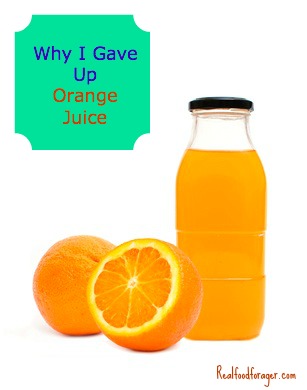Orange Juice has to be the most refreshing and healthy drink around. It’s full of important vitamin C and other anti-oxidants. You can get a carton of not-from-concentrate OJ made by conventional companies that is pure fresh orange juice — right? It says so right on the label…
Full of Pesticides
My first complaint about orange juice is that most conventional brands are full of pesticides. It’s more expensive to get organic OJ and sometimes it is not on the grocery shelf.
Back in 2012 the FDA discovered the fungicide carbendazim – which has been banned from farm use in the US since 2009 due to concerns over potential liver, eye, and brain damage – in orange juice imported from Brazil as well as orange juice samples from Canada.
However, the FDA found the levels of carbendazim to be low enough not to cause concern and they deemed the juice safe to drink. At the time, they did suspend juice imports pending further testing.
Apparently the FDA does inspect and test imported juice or juice concentrates for pesticide levels. But what about the pesticides used here? Do you really want your kids to be drinking juice with other pesticides? Some have been found to be more dangerous than others, but it is just a matter of time before current pesticides are exposed for the poisons they are.
If you are going to drink orange juice, at least make it organic.
Orange Juice is Highly Glycemic
Orange juice packs a huge sugar punch. An 8 ounce glass of orange juice provides between 22 and 29 grams of sugar or more depending on the brand — much of it as fructose. It’s almost as sugar laden as regular coke — and because of it — just as bad.
Dr. Robert Lustig has written much about the dangers of sugar — particularly the fructose in fruit and fruit juices. Research has shown that the fructose in isolated fruit juices are broken down by the liver. This is a stress on the liver and leads to many of the chronic diseases that are epidemic in this country today such as metabolic syndrome, obesity and diabetes.
Just because the sugar is naturally occurring in the juice does not mean it is good for you.
Additionally, the other problem with juice is that all the fiber is removed. The fiber at least helps to slow down the absorption of the sugar. Without the fiber, the sugar goes right into the bloodstream, just like a candy bar. In fact, a glass of orange juice has more sugar then several donuts, cookies or even cake.
As part of the ongoing Nurse’s Health Study, in April 2008 this study published in the journal Diabetes Care, looked at the diets of 70,000 women. They found that daily consumption of fresh fruit and vegetables was associated with an 18 per cent reduction in the risk of diabetes, while consumption of fruit juice even in small daily amounts, was associated with an overall 18 per cent increased risk of the disease.
Child Labor Used to Pick the Fruit
According to this report children in Mexico and Brazil pick the oranges 6 months out of the year earning about $3.00 for working a 14 hour day — or 21 cents an hour. The juice is for the huge orange juice from concentrate market — you may have seen the country of origin on some juice cartons. But they don’t mention the little hands that pick the fruit.
Working conditions for the children are unsafe, unsanitary and they are exposed to pesticides daily.
According to this article, Europe has started importing fair trade orange juice which has been grown and marketed according to strict regulations. These regulations include both minimum labor and environmental standards. Hopefully that is happening other places as well.
Deceptive Labeling Leads to a Class Action Suit
Tropicana (Pepsico Brand) orange juice is being sued in a class action suit that alleges there is false labeling to the “100% pure and natural” statement on the carton of Tropicana Pure Premium orange juice. I wonder how they are going to prove the orange juice is “pure and natural”when it goes through the heating of pasteurization, processing, and the addition of coloring and flavoring. What’s 100% pure and natural about all that?
This consumer class action suit is actually a consolidation of many similar class action suits across the country that have now been focused into the New Jersey case that is being contested.
According to Courthouse News Service, Tropicana’s website claims that
Tropicana Pure Premium is 100 percent pure and natural juice, with 16 fresh-picked oranges squeezed into every 59-ounce container. No water, sugar, or preservatives are ever added and it is never from concentrate, so you can get only the freshest, most delicious straight-from-the-orange taste.
The consolidated federal action in New Jersey alleges that Tropicana Products, is lying about its “not-from-concentrate” (NFC) orange juice.
Harumph!
The Plaintiffs allege that,
Tropicana launched a marketing campaign in which it misrepresented its juice as ‘100% pure and natural orange juice,’ when it was the product of extensive processing, coloring, and flavoring… Tropicana unscrupulously capitalizes on consumers’ heightened demand for natural products by deceptively marketing its NFC juice.
U.S. District Judge Dennis Cavanaugh concluded that the plaintiffs have satisfied the pleading standard of Federal Rule of Civil Procedure and the case may proceed.
Orange Juice is Highly Processed
According to the plaintiffs, juice manufacturing involves a highly processed procedure that strips the juice of flavor and aroma and stores it for long periods of time. To make it seem fresh flavor and fragrance packets are added to it before packaging.
These flavor packets are created by flavor and fragrance experts who deal with chemicals in much the same way as in perfume manufacturing. There, thousands of chemicals can be in one fragrance.
Furthermore, according to this article, some of the chemicals in these flavor packets are terpene compounds such as valencine. Terpenes occur naturally, and are sourced from plants. However, once they have been chemically altered they become terpenoids and are used to remove paint from brushes, as in turpentine, the caustic artist’s medium.
According to the Weston Price Foundation in this article, the processing of orange juice is a nasty business.
The new method of producing juice puts the whole orange in the machine. Another abstract states: “Various acid sprays for improving fruit peel quality and increasing juice yield are added to these processed oranges.” These compounds are added to extract as much juice as possible, as well as the oil out of the skin. The conventional orange crop is sprayed heavily with pesticides called cholinesterase inhibitors, which are very toxic to the nervous system. When they put the whole oranges into the vats and squeeze them, all that pesticide goes into the juice. Then they add acids to get every single bit of juice out of these oranges. So commercial orange juice can be a very toxic soup.
The juice is clearly not fresh or 100% pure at all. However none of that is on the label.
Company Claims
The company claims that no water, sugar or preservatives are ever added so that you get the freshest, most delicious straight-from-the-orange taste. However, they fail to mention all the other things that are added to the juice — things most people would not dream of.
Pasteurization heats the juice and everyone knows that once you heat juices, the vitamins evaporate, including vitamin C.
They also claim that since they use the term pasteurized on the carton, it shelters them from liability of false labeling because this apparently is the only requirement of the FDA under federal law.
Where to Get Vitamin C and Other Anti-Oxidants
The original reason to have orange juice — before all the fancy sweet juice based drinks on the market — was to get vitamin C. You don’t have to drink a sugary, pesticide laden drink that will spike your blood sugar, and then cause a crash. Not to mention all the other issues.
Here are some ways to get vitamin C and anti-oxidants from other sources.
- Sauerkraut — Make your own homemade sauerkraut by lacto-fermentation and you will be provided with plenty of vitamin C. Have some at each meal and it will also help you digest your food better.
- Beet Kvass — Easy to make at home and full of anti-oxidants.
- Lacto-Fermented Dill Pickles — So easy to make and so delicious and fun!
- Fruit Smoothies — Make a combination of fresh fruit juice with coconut milk or raw milk. The milk will provide fat that balances the sugar in the juice.
If you must have orange juice, squeeze your own fresh juice from organic oranges and drink the pulp.
Do you have any suggestions as to how to get vitamin C in other foods and drinks? Leave a comment and let me know!













